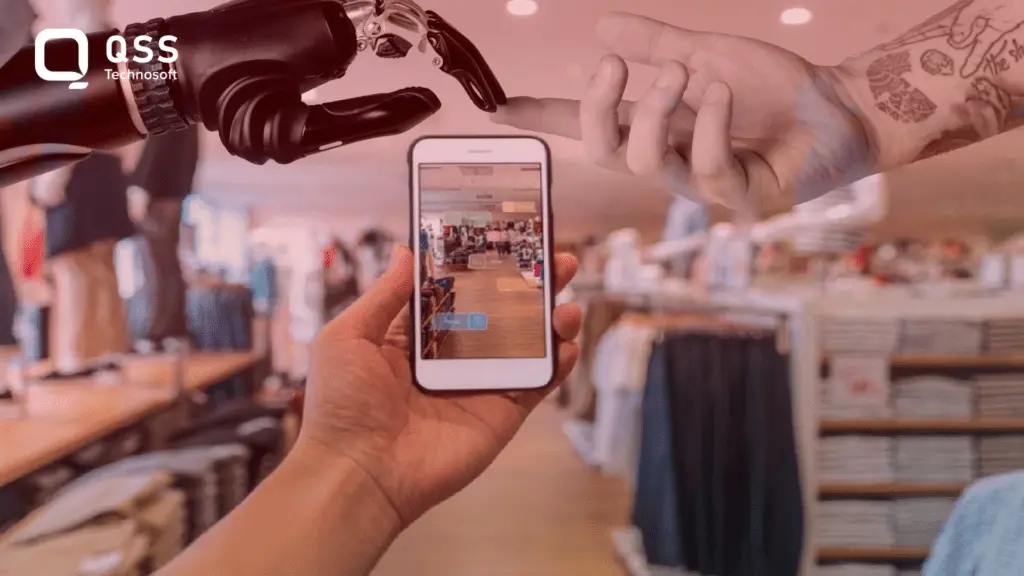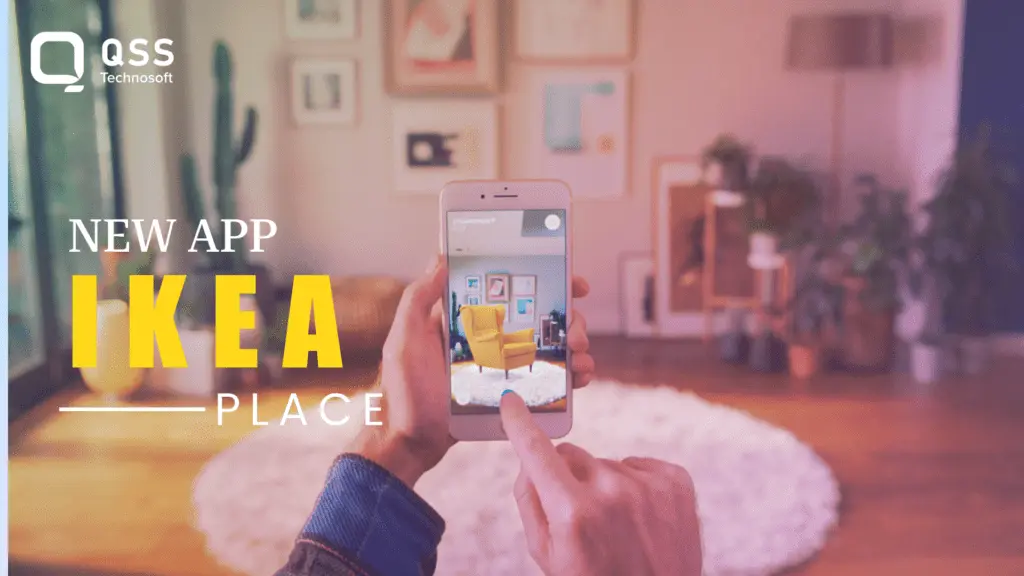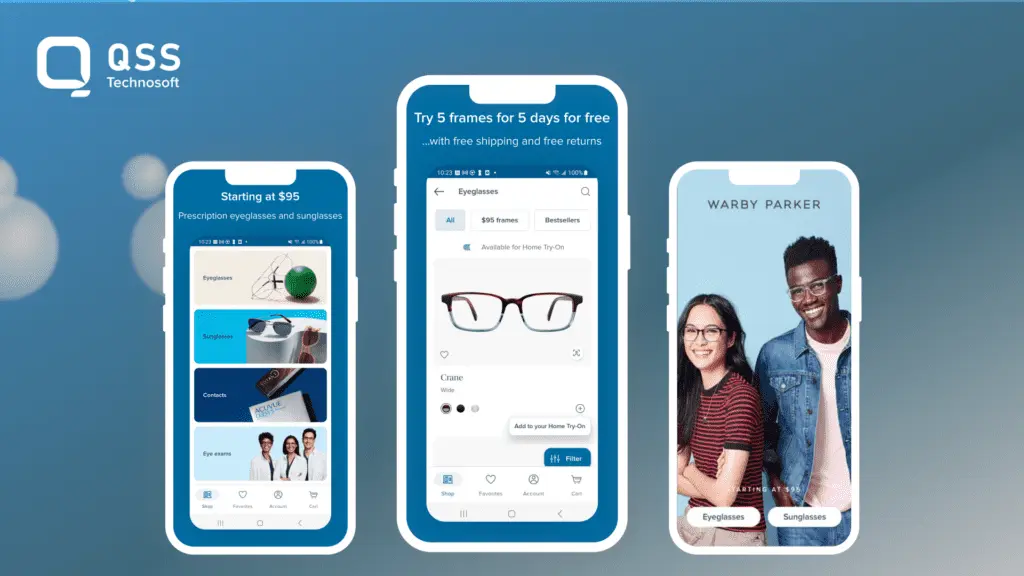Are you surprised by how generation is converting the way we shop and store? Well, it is actually! Technology is advancing so rapidly, and it is making online buying even extra exciting. One cool thing that is creating a buzz is Augmented Reality (AR). But what exactly is AR, and how is it making a difference in our shopping experience? AR in eCommerce is a smart technology that blends virtual and actual worlds collectively. It helps you to use your phone or a unique tool to peer virtual matters in the actual world. And guess what? Lots of human beings are loving it! By 2022, it’s anticipated that approximately 100 million folks will use AR for purchasing. That’s a huge bounce of 65% from the 12 months before! As you can see, increasingly more people are getting addicted to AR when they keep online.

Read Also : What Does it Cost to Build Metaverse Healthcare Solution?
Example:
Let’s consider you’re seeking out a new couch for your residing room. In the beyond, you need to depend upon measurements and your imagination to determine if it’s going to fit properly.
But now, with AR, you may simply use your phone’s digital camera to convey a virtual couch into your real dwelling room! You can see the way it appears, change the colors and materials, and even sit down on it surely. It’s like having a real buying revel in without leaving your home!
In this blog, we will read more about AR in e-commerce.
Benefits of AR in eCommerce
Augmented reality (AR) has revolutionized the way we experience the world around us. This technology has also made a significant impact on the eCommerce industry, enhancing the shopping experience for both businesses and consumers alike. Lets take a look at key benefits of AR in eCommerce to highlight their significance.
Increased Customer Engagement:
AR allows customers to interact with products virtually, offering a more engaging and immersive shopping experience. For instance, IKEA’s AR app allows customers to visualize furniture in their own space before making a purchase. This level of engagement leads to enhanced customer satisfaction and ultimately boosts sales.

Reduced Product Returns:
One of the major pain points for online retailers is product returns. AR helps mitigate this issue by offering customers a realistic view of how products will look and fit in their surroundings. Warby Parker’s virtual try-on feature allows customers to virtually try on glasses, reducing the number of returns due to incorrect fit or dissatisfaction with appearances.
Read Our Page : Complete Guide to Mobile App Development in 2023

Increased Sales Conversion Rates:
AR provides customers with a realistic representation of products, leading to increased confidence in their purchasing decisions. Sephora’s Virtual Artist app enables customers to virtually try on makeup, empowering them to make informed choices. This leads to higher conversion rates as customers can visualize and evaluate products before committing to a purchase.
Personalized Shopping Experience:
By using AR, eCommerce businesses can offer personalized recommendations based on customer preferences and purchase history. Amazon’s AR View allows customers to visualize how products would look in their homes, while also recommending additional items based on their previous purchases. This personalization enhances the overall shopping experience and increases customer loyalty.
Improved Product Showcase:
AR enables online retailers to showcase their products in a more comprehensive manner, providing detailed information in an interactive format. For example, Lacoste’s AR app lets customers virtually try on shoes and explore various features of the product, such as color options and material details. This improves product visibility and helps customers make more informed decisions.

1.Enhanced Brand Differentiation:
AR sets businesses apart from competitors by offering unique and innovative shopping experiences. Burberry utilized AR to create a virtual replica of their flagship store, allowing customers to explore and shop from the comfort of their homes. Such experiences not only differentiate a brand but also create a lasting impression on customers, leading to increased brand loyalty.
Reduced Purchase Anxiety:
AR helps alleviate customers’ purchase anxiety by providing them with a realistic preview of products. For instance, BMW’s AR app enables customers to view and explore the interior and exterior of cars, reducing the uncertainty associated with big-ticket purchases. This leads to increased customer satisfaction and consequently, a boost in sales.
Virtual Showrooms and Try-ons:
AR technology enables eCommerce businesses to create virtual showrooms and try-on experiences, eliminating the need for physical stores. The clothing brand ASOS implemented AR technology to allow customers to virtually try on clothing items, enhancing convenience and expanding their customer base beyond geographical limitations.
Cost Reduction for Businesses:
AR reduces costs associated with traditional retail models, such as inventory management and physical store maintenance. Online furniture retailer Wayfair’s AR app allows customers to visualize how furniture will fit in their living spaces, eliminating the need for expensive physical showrooms. This, in turn, leads to substantial cost savings for businesses.
Read Also : How AI Tools like ChatGPT is Solving Top Industry Challenges?
Improved Customer Satisfaction and Retention:
By using AR technology, eCommerce businesses can provide exceptional shopping experiences, leading to increased customer satisfaction and retention. The beauty retailer Sephora introduced an AR-powered app called “Virtual Artist,” which allows customers to virtually try on makeup. This unique offering enhances customer satisfaction and promotes repeat purchases.
As AR continues to evolve, we can expect more exciting advancements that will shape the future of eCommerce.
Use Cases for AR in eCommerce
Fashion and Beauty: AR is widely used in the fashion and beauty industry, enabling customers to virtually try on clothes, accessories, and makeup without physically trying them on. Brands like Sephora and Gucci have successfully integrated AR to enhance their customers’ shopping experiences.
Home Décor: AR allows customers to virtually preview how furniture or décor items will look in their homes before making a purchase. Major home improvement retailers such as IKEA and Wayfair have incorporated AR technology into their apps, giving customers a realistic sense of the product’s size, style, and fit.
Automotive: Several automotive brands, including Audi and BMW, have embraced AR to empower customers in visualizing and customizing their vehicles. AR applications provide customers with a 360-degree view, interactive features, and the ability to overlay options such as colours and accessories.
Jewellery: AR can offer customers the option to virtually try on jewellery items, leading to increased confidence in purchasing expensive pieces. Brands like Tiffany & Co. and Kendra Scott utilize AR to improve the shopping experience for their customers.
Retail and E-commerce Platforms: AR is increasingly being integrated into retail and e-commerce platforms to provide customers with interactive experiences while shopping online. Platforms like Amazon and Alibaba are exploring AR technology to allow customers to virtually try on clothes and see how they fit before making a purchase.
Read Also : Exploring the Impact of Generative AI in Design and Content Creation
Real-world Examples
IKEA Place: IKEA’s AR mobile app, IKEA Place, enables customers to virtually place furniture items in their homes at scale, allowing them to assess size, fit, and style before purchasing.
Warby Parker: The renowned eyewear brand, Warby Parker, uses AR technology to allow customers to virtually try on glasses through their mobile app, offering an interactive shopping experience.
L’Oréal Makeup Genius: L’Oréal’s Makeup Genius app utilizes AR to enable customers to try on makeup virtually, helping them find the perfect shade without physically trying multiple products.
ASOS Virtual Catwalk: ASOS, a popular online fashion retailer, introduced a virtual catwalk feature that allows customers to see models wearing clothes in their own homes. This gives customers a realistic sense of how the product fits and moves.
BMW i Visualizer: BMW offers its customers an AR-powered app called BMW i Visualizer, allowing them to visualize and customize their cars, selecting from various exterior colours and wheel options.
Grow Your eCommerce Business with QSS Technosoft’s AR Development Services
Hey! Are you looking to take your eCommerce business to the next level? OR Do you want to provide your customers with an immersive shopping experience?
QSS Technosoft can help you achieve this through our AR development services. – Our team of experts can create AR solutions that will enhance your customers’ shopping experience and increase engagement. With our AR technology, customers can visualize products in their environment before making a purchase, leading to higher conversion rates.
Don’t miss out on the opportunity to revolutionize your eCommerce business with QSS Technosoft’s AR development services.
Contact us today to learn more.
Conclusion
Integrating AR technology in eCommerce opens up exciting possibilities for businesses to revolutionize the online shopping experience.
As a user, you can expect enhanced visualization, increased engagement, and convenience when interacting with products virtually. By embracing AR, businesses can provide a more personalized and immersive shopping experience, ultimately bridging the gap between the virtual and physical worlds.
So, thanks to AR, online shopping is becoming super cool! It’s more immersive, interactive, and personalized. You can try out stuff virtually and make better choices. Isn’t that amazing?
So, get ready to enjoy a new dimension of online shopping that will truly cater to your unique preferences and needs.
We are proud to mention that our work has been recognized by leading B2B reviews and research platforms like GoodFirms, Clutch, MirrorView, and many more.


AR in eCommerce – 10 benefits, use cases, and real-world examples for businesses